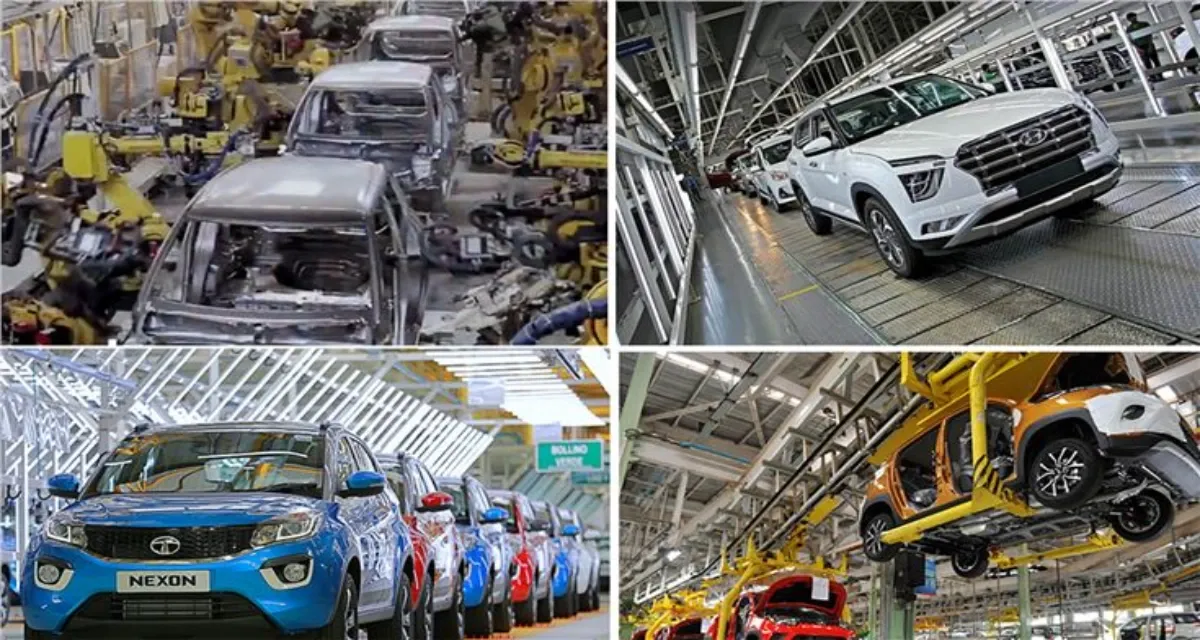

Nine major car manufacturers in India, responsible for 97% of domestic market sales, are planning to expand their production capacity significantly. According to CRISIL Intelligence and Analytics, these companies are set to increase their capacity by three million cars annually, which is a 52% rise from the current 5.77 million cars.
Once these new plants become operational, India will have a total capacity of 8.77 million passenger vehicles per year. This expansion includes not only traditional internal combustion engine (ICE) vehicles but also electric and hybrid cars. The new capacities are expected to come online between November 2024 and the fiscal year 2031.
The companies involved in this massive expansion include Maruti Suzuki, Hyundai Motor, Tata Motors, Mahindra & Mahindra, Kia Motors, Toyota Kirloskar, Honda Cars India, Skoda Auto Volkswagen, and MG Motors. Notably, this list does not account for new investments announced by Vinfast for car manufacturing in India.
The decision to expand capacity is driven by impressive sales figures and optimistic future projections. India recorded a historic 4.2 million vehicle sales in the fiscal year 2024. According to S&P, this number is expected to reach 8.2 million by 2035, up from an estimated 5.1 million in 2025. This growth would position India as the third-largest car market globally, following China and the United States.
Despite these high sales figures, car ownership in India remains relatively low, with only 26 cars per 1,000 people. This is significantly lower than countries like China (183), the US (594), South Korea (384), Mexico (280), and Brazil (276). This low penetration rate highlights the immense potential for growth in the Indian automotive market.
India has experienced one of the most significant recoveries in car sales post-pandemic, with a 35.03% growth between 2019 and 2023. This remarkable turnaround is the best globally. Once the new capacities are available, four auto giants—Maruti Suzuki, Hyundai, Tata Motors, and Mahindra & Mahindra—will dominate the market, controlling 81% of the country's car production capacity.
Maruti Suzuki is leading the expansion with plans to launch its first electric car by the end of the year, initially for export and later for the domestic market. The company is setting up a plant in Kharkhoda, Haryana, with a capacity of 250,000 cars per year, expected to be operational by 2025.
Additionally, a new plant in Gujarat will add another one million cars per year by 2029. Maruti Suzuki is also expanding its existing plant to accommodate an additional 250,000 vehicles.
Mahindra & Mahindra is almost doubling its production capacity from 590,000 to 1.08 million cars per year. Hyundai Motors, which has applied for a significant IPO, plans to increase its capacity from 920,000 to over one million cars per year by expanding its recently acquired Talegaon plant from General Motors.
Hyundai has announced an investment of Rs 32,000 crore for this expansion, focusing on capacity increase, research and development, and creating a local supply base.
Kia Motors is also ramping up its capacity, aiming to produce 400,000 cars annually by fiscal year 2025, up from the current 350,000. Meanwhile, MG Motors, with substantial investment from the JSW group, plans to increase its capacity at the Halol plant in Gujarat from 100,000 to 300,000 cars.
In Conclusion, The Indian automotive industry is on the cusp of a significant transformation, with nine leading manufacturers planning substantial expansions to meet growing demand. This strategic move is poised to position India as a major global player in the automotive sector, driven by impressive sales growth and the untapped potential of a low car ownership rate.
Also Read: